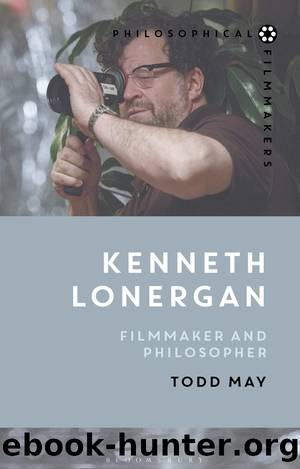Kenneth Lonergan by Todd May

Author:Todd May
Language: eng
Format: epub
Publisher: Bloomsbury Publishing
Conclusion
Self-deception is often a temptation. It can be motivated by many different aspects of our experience, but it is most tempting when we are in the presence of facets of ourselves that we would rather not acknowledge or avow. Those facets can be revealed in our suffering, and in particular in our suffering in relation to death.
However, the temptation of self-deception is not solely an individual thing. It is bound to the norms of the societies we inhabit. For the most part we suffer from facets of ourselves that violate social norms, or at least would if we allowed them to be seenâeven to ourselves. So we hide those facets from ourselves and from others. Lisa Cohen hides her guilt for the participation in causing the death of Monica Patterson from herself until she can no longer. Sammy Prescott hides her struggle against the constraints of Scottsville behind her smile and her religion while Terry hides his inability to move on behind his anger and resentment toward those same constraints.
This is where what some think of as the paradox of self-deception arises. How can we hide uncomfortable facets of ourselves from ourselves without knowing we are doing so? However, as we have seen, there is no real paradox here. The human mind is a capacious thing, more unconscious than conscious. Anxiety protects us from spelling out to ourselves some of what is unconscious, while avowal and disavowal and their related strategies do the conscious work of maintaining a view of ourselves that is preferable for us to have.
As always with Lonerganâs films, the depth and the complexity of his characters and the fine-grained specificity of their circumstances resist sweeping conclusions at the same time they offer us glimpses into the human condition. Lisa Cohenâs self-deception is not Sammy or Terry Prescottâs, and each of theirs is not the otherâs. And, as we have seen and will see again, each of them is a âfull human being.â They are not reducible to their self-deceptions; they are always more than those.
Sometimes, however, self-deception is not an option. When someone causes the death of his children by fire, and through his own negligence, perhaps he must be exiled to a territory beyond self-deception. It is no longer available to him. And this, too, teaches us something. Self-deception, often derided in discussions of it, is not always an aspect of ourselves to be overcome, not even to the limited extent to which we may be capable of it. The goal of knowing who we are or of admitting to ourselves who we are, while important in many cases, has its limits. If the Delphic mantra is âKnow thyself,â perhaps it ought to be modified into the less pithy but more accurate, âKnow thyself to the extent that thou can do so and still go on.â After all, we are creatures with emotional limits as well as epistemic ones. There is only so much we can take before we crack. Lee Chandler, who stands on the far side of self-deception, reminds us of this.
Download
This site does not store any files on its server. We only index and link to content provided by other sites. Please contact the content providers to delete copyright contents if any and email us, we'll remove relevant links or contents immediately.
Naked as Nature Intended by Pamela Green(452)
The Filmmaker's Guide to Creatively Embracing Limitations: Not Getting What You Want Leading to Creating What You Need (for True Epub) by Pace William & Stobbe Ingrid(445)
30 Movies to Get You Through the Holidays by Roger Ebert(418)
Bond, James Bond by Brad Gilmore(386)
It's Only a Movie! by Haberski Jr. Raymond J(354)
The Making Of Horror Movies by Jennifer Selway(330)
Chinese films in focus II by Unknown(314)
How To Write A Novel The Easy Way Using The Pulp Fiction Method To Write Better Novels: Writing Skills by Jim Driver(313)
The Fellowship of the Knits: Lord of the Rings: The Unofficial Knitting Book by Tanis Gray(310)
Smartphone Cinema: Making Great Films with Your Mobile Phone by Bart Weiss(310)
Charles McGraw by Alan K. Rode(290)
Film Truth; November, 1920 by Anonymous(287)
Thomas Mann and Friedrich Nietzsche: Eroticism, Death, Music, and Laughter by Caroline Joan Picart(286)
The Greatest Show on Earth by Jerry Pinto(284)
The Romanian Cinema of Nationalism: Historical Films as Propaganda and Spectacle by Onoriu Colăcel(269)
Jurassic Park and Philosophy by Watkins Jessica Michaud Nicolas(264)
The Garden in the Machine by Unknown(262)
Jafar Panahi: Interviews by Unknown(258)
The Reel Truth by Reed Martin(258)
